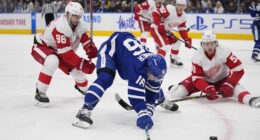- Darren Dreger: Early word is the former Flames GM Jay Feaster could sense something was wrong.
- Hope Smoke: Bob McKenzie: “Nieuwendyk is the front runner if it’s a job he’s interested in. Joe did make some mistakes in Dallas” … “The question I ask is, does Nieuwendyk want to jump back into GM position right away?”
- Hope Smoke: Darren Dreger “I’d be shocked if the Leafs did not grant Calgary permission to interview Loiselle and Poulin for their vacant GM position” … “I know how highly regarded Joe Nieuwendyk is by Burke. This position screams for Joe if he wants it”
- Calgary Flames: The Flames send Sven Baertschi to the AHL.
- Bolt Prospects: TSN’s Craig Button described the Lightning’s farm system as similar to the Red Wings, prospects are “over-ripe” when they are called up.
- Katie Carrera of the Washington Post: The Capitals send Michal Neuvirth to the AHL on a conditioning stint.
“It’s his decision, which is a great decision by him, I think,” Coach Adam Oates said. “We gave him a chance that he’s missed some time ‘Do you want to go down for some conditioning?’ He didn’t bat an eye and said yeah, but it’s still his decision.”
- Dan O’Neill of the St. Louis Post Dispatch: Blue chairman Tom Stillman on the rising salary cap.
“The first thing (the rising salary cap) indicates is the league is healthy, really on the upswing, the game of hockey and the NHL. It says good things about the game,” Blues chairman Tom Stillman said.
“The second thing is, it just kind of reinforces the need for us to expand our revenue base. Because we need to compete with teams that are going to spend to that cap level. We have to be competitive off the ice, in the revenue department, if we’re going to be competitive on the ice.”
Forbes says that the Maple Leafs brought in more than $2.2 million per game last season in gate receipts.
“You have a situation where, yeah, league-wide revenues are going up,” Stillman said. “And some of them are at the central level, like the recent Canadian TV deal. But you have the Canadian teams and big market U.S. teams that are just rolling at a very high percentage on a very big base.
“And all of that pulls up the cap for everybody. So we can be going along and doing pretty well, but if that thing is being pulled up by the super-charged markets, well, we have to compete in that world. Our job is to make sure we’re doing everything we can to expand out basis of support and increase our revenues so we can stay competitive.”



